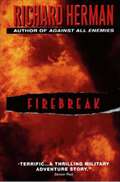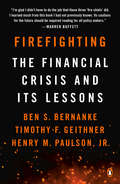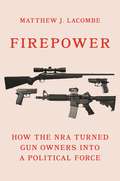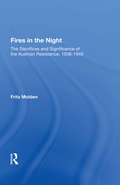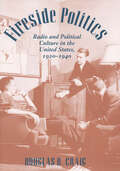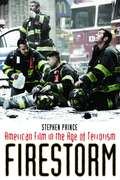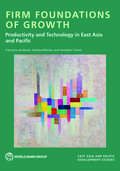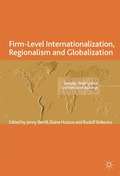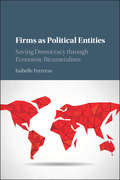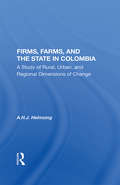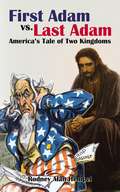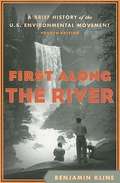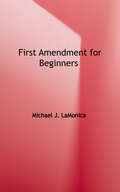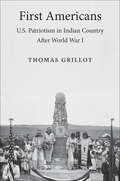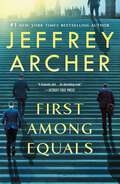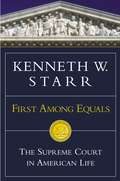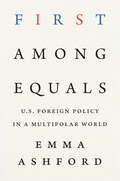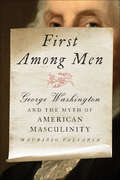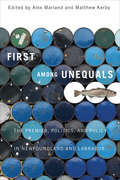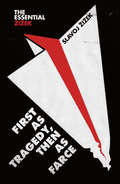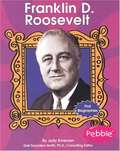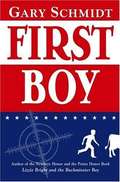- Table View
- List View
Firebreak
by Richard HermanThe “master of the techno-thriller” moves from the oval office to the frontlines as war erupts in the Middle East in this “fast-paced novel” (Publishers Weekly).In the wake of the Gulf War, a madman still holds the reins of power in Iraq. When his call for a Holy War unites the Arab world against Israel, the resulting combat is certain to have Earth-shattering implications. Israel stands ready to unleash its nuclear arsenal, and it’s up to American President Zack Pontowski to deescalate the situation. As military and geopolitical forces reach a fever pitch, the only chance to avoid Armageddon is to take out Iraq’s chemical weapons arsenal. Pontowski dispatches the 45th Tactical Fighter Wing—a squadron led by his own grandson—to execute the mission.
Firefighting: The Financial Crisis and Its Lessons (Images Of America Ser.)
by Henry M. Paulson Ben S. Bernanke Timothy F. GeithnerFrom the three primary architects of the American policy response to the worst economic catastrophe since the Great Depression, a magnificent big-picture synthesis--from why it happened to where we are now.In 2018, Ben Bernanke, Tim Geithner, and Hank Paulson came together to reflect on the lessons of the 2008 financial crisis ten years on. Recognizing that, as Ben put it, "the enemy is forgetting," they examine the causes of the crisis, why it was so damaging, and what it ultimately took to prevent a second Great Depression. And they provide to their successors in the United States and the finance ministers and central bank governors of other countries a valuable playbook for reducing the damage from future financial crises. Firefighting provides a candid and powerful account of the choices they and their teams made during the crisis, working under two presidents and with the leaders of Congress.
Firepower: How the NRA Turned Gun Owners into a Political Force (Princeton Studies in American Politics: Historical, International, and Comparative Perspectives #180)
by Matthew J. LacombeHow the NRA became a political juggernaut by influencing the behaviors and beliefs of everyday AmericansThe National Rifle Association is one of the most powerful interest groups in America, and has consistently managed to defeat or weaken proposed gun regulations—even despite widespread public support for stricter laws and the prevalence of mass shootings and gun-related deaths. Firepower provides an unprecedented look at how this controversial organization built its political power and deploys it on behalf of its pro-gun agenda.Taking readers from the 1930s to the age of Donald Trump, Matthew Lacombe traces how the NRA's immense influence on national politics arises from its ability to shape the political outlooks and actions of its followers. He draws on nearly a century of archival records and surveys to show how the organization has fashioned a distinct worldview around gun ownership and used it to mobilize its supporters. Lacombe reveals how the NRA's cultivation of a large, unified, and active base has enabled it to build a resilient alliance with the Republican Party, and examines why the NRA and its members formed an important constituency that helped fuel Trump's unlikely political rise.Firepower sheds vital new light on how the NRA has grown powerful by mobilizing average Americans, and how it uses its GOP alliance to advance its objectives and shape the national agenda.
Fires In The Night: The Sacrifices And Significance Of The Austrian Resistance
by Fritz MoldenThis book is a factual account by a man who witnessed some of the events occurred between 1938–1945. It aims to commemorate the tens of thousands of men and women who gave their lives for Austria and for the victory of humaneness, justice, and freedom over the bestial Nazi tyranny.
Fireside Politics: Radio and Political Culture in the United States, 1920-1940 (Reconfiguring American Political History)
by Douglas B. CraigIn Fireside Politics, Douglas B. Craig provides the first detailed and complete examination of radio's changing role in American political culture between 1920 and 1940—the medium's golden age, when it commanded huge national audiences without competition from television. Craig follows the evolution of radio into a commercialized, networked, and regulated industry, and ultimately into an essential tool for winning political campaigns and shaping American identity in the interwar period. Finally, he draws thoughtful comparisons of the American experience of radio broadcasting and political culture with those of Australia, Britain, and Canada.
Fireside Politics: Radio and Political Culture in the United States, 1920–1940 (Reconfiguring American Political History)
by Douglas B. CraigAn “impressively researched and useful study” of the golden age of radio and its role in American democracy (Journal of American History).In Fireside Politics, Douglas B. Craig provides the first detailed and complete examination of radio’s changing role in American political culture between 1920 and 1940—the medium’s golden age, when it commanded huge national audiences without competition from television.Craig follows the evolution of radio into a commercialized, networked, and regulated industry, and ultimately into an essential tool for winning political campaigns and shaping American identity in the interwar period. Finally, he draws thoughtful comparisons of the American experience of radio broadcasting and political culture with those of Australia, Britain, and Canada.“The best general study yet published on the development of radio broadcasting during this crucial period when key institutional and social patterns were established.” ?Technology and Culture
Firestorm: American Film in the Age of Terrorism
by Stephen PrinceIt was believed that September 11th would make certain kinds of films obsolete, such as action thrillers crackling with explosions or high-casualty blockbusters where the hero escapes unscathed. While the production of these films did ebb, the full impact of the attacks on Hollywood's creative output is still taking shape. Did 9/11 force filmmakers and screenwriters to find new methods of storytelling? What kinds of movies have been made in response to 9/11, and are they factual? Is it even possible to practice poetic license with such a devastating, broadly felt tragedy?Stephen Prince is the first scholar to trace the effect of 9/11 on the making of American film. From documentaries like Fahrenheit 9/11 (2004) to zombie flicks, and from fictional narratives such as The Kingdom (2007) to Mike Nichols's Charlie Wilson's War (2007), Prince evaluates the extent to which filmmakers have exploited, explained, understood, or interpreted the attacks and the Iraq War that followed, including incidents at Abu Ghraib. He begins with pre-9/11 depictions of terrorism, such as Alfred Hitchcock's Sabotage (1936), and follows with studio and independent films that directly respond to 9/11. He considers documentary portraits and conspiracy films, as well as serial television shows (most notably Fox's 24) and made-for-TV movies that re-present the attacks in a broader, more intimate way. Ultimately Prince finds that in these triumphs and failures an exciting new era of American filmmaking has taken shape.
Firm Foundations of Growth: Productivity and Technology in East Asia and Pacific
by Aaditya Mattoo Francesca de Nicola Jonathan TimmisIn an era of rapid global technological change, productivity growth in the East Asia and Pacific (EAP) region has decelerated. The most-productive firms in EAP, the “national frontier,†? are lagging behind the world’s leading firms, the “global frontier,†? particularly in the digital-intensive sectors driving innovation. This widening gap is critical, as these national frontier firms are pivotal to output, employment, and the dissemination of advanced technologies to other domestic enterprises. Detailed firm-level analysis reveals that barriers to competition are stifling incentives to innovate and are inhibiting the movement of workers and capital to more-productive firms. At the same time, inadequate skills and infrastructure are constraining the region's capacity to innovate. Firm Foundations of Growth: Productivity and Technology in East Asia and Pacific argues that enhancing competition, bolstering digital infrastructure, and developing relevant skills can reignite productivity growth across the region, particularly for frontier firms. This book will be of interest to researchers, businesses, and policy makers dedicated to understanding and addressing the productivity challenges in the EAP region.
Firm-Level Internationalization, Regionalism and Globalization
by Elaine Hutson Rudolf R. Sinkovics Jenny BerrillThe current international business environment is characterized by two contradictory but at times mutually supplementary trends. Regionalization is part of the process of globalization, but it can also be a counter force to globalization as stakeholders act to protect their perceived interests. This book expands the debate on this interesting topic
Firms as Political Entities: Saving Democracy through Economic Bicameralism
by Isabelle Ferreras Mouillot Miranda RichmondWhen people go to work, they cease to be citizens. At their desks they are transformed into employees, subordinate to the hierarchy of the workplace. The degree of their sense of voicelessness may vary from employer to employer, but it is real and growing, inflamed by populist propaganda that ridicules democracy as weak and ineffective amid global capitalism. At the same time, corporations continue untouched and even unremarked as a major source of the problem. Relying on 'economic bicameralism' to consider firms as political entities, this book sheds new light on the institutions of industrial relations that have marked the twentieth century, and argues that it is time to recognize that firms are a peculiar institution that must be properly organized in order to unshackle workers' motivation and creativity, and begin nurturing democracy again.
Firms, Farms, And The State In Colombia: A Study Of Rural, Urban, And Regional Dimensions Of Change
by A.H.J. HelmsingThis book on the regional development theory analyzes the institutional environment, singling out three factors: the textile industry; government that provided key infrastructural provisions; and cotton-grower associations that were able to counter-balance the monopsony of the textile companies.
First Adam vs. Last Adam: America’s Tale Of Two Kingdoms
by Rodney HempelFirst Adam vs. Last Adam offers a viewpoint of America&’s embrace of our national government and those citizens who also embrace the kingdom of God. The current inability of our political leaders to find workable solutions to our country&’s problems is troubling for many Americans. Confidence in our leader&’s ability to effectively govern is a low point.This brief commentary takes the reader back to the fundamental perspective of the original writers of the Declaration of Independence. This document forms the basis of America&’s initial desire to be free from onerous laws imposed by the British sovereign.Today our government has reassumed the role of a sovereign king in many matters. That authority needs to be challenged with the authority of the kingdom of God.This is a call for Christians to reflect upon misguided leadership offering inadequate solutions.
First Along the River: A Brief History of the U.S. Environmental Movement (Fourth Edition)
by Benjamin KlineThis book provides students with a balanced, historical perspective on the history of the environmental movement in relation to major social and political events in U.S. history.
First Amendment Institutions
by Paul HorwitzAddressing a host of hot-button issues, from the barring of Christian student groups and military recruiters from law schools and universities to churchesâ immunity from civil rights legislation in hiring and firing ministers, Paul Horwitz proposes a radical reformation of First Amendment law. Arguing that rigidly doctrinal approaches canât account for messy, real-world situations, he suggests that the courts loosen their reins and let those institutions with a stake in First Amendment freedoms do more of the work of enforcing them. Universities, the press, libraries, churches, and various other institutions and associations are a fundamental part of the infrastructure of public discourse. Rather than subject them to ill-fitting, top-down rules and legal categories, courts should make them partners in shaping public discourse and First Amendment law, giving these institutions substantial autonomy to regulate their own affairs. Self-regulation and public criticism should be the key restraints on these institutions, not judicial fiat. Horwitz suggests that this approach would help the law enhance the contribution of our âFirst Amendment institutionsâ to social and political life. It would also move us toward a conception of the state as a participating member of our social framework, rather than a reigning and often overbearing sovereign. First Amendment Institutions offers a new vantage point from which to evaluate ongoing debates over topics ranging from campaign finance reform to campus hate speech and affirmative action in higher education. This book promises to promoteâand provokeâimportant new discussions about the shape and future of the First Amendment.
First Amendment for Beginners (For Beginners Ser.)
by Michael J. LaMonicaThe author takes you on a journey through the ins and outs of an amendment that means so much more than just freedom of speech. The book will explore some of the biggest cases ever to come before the Supreme Court and answer questions such as whether it really is okay to shout "fire" in a crowded theater, burn the flag, burn your draft card, join the Communist party, sell nudie magazines, ban Ku Klux Klan marches, and publish confidential government secrets in a newspaper, to name just a few. The religion clauses are included too, with pertinent questions such as whether the First Amendment protects your right to use psychoactive drugs in religious rituals, marry multiple partners, or engage in animal sacrifice. The book also wades into the political maelstrom to examine recent controversies such as whether money really equals speech and if corporations have constitutionally protected rights to speech and religion. Whether you're a court watcher, political junkie, history buff, civil libertarian, news enthusiast, or just curious about the most important amendment in the Constitution, this book is for you!
First Americans: U.S. Patriotism in Indian Country after World War I
by Thomas GrillotThe little-known story of how army veterans returning to reservation life after World War I transformed Native American identity. Drawing from archival sources and oral histories, Thomas Grillot demonstrates how the relationship between Native American tribes and the United States was reinvented in the years following World War I. During that conflict, twelve thousand Native American soldiers served in the U.S. Army. They returned home to their reservations with newfound patriotism, leveraging their veteran cachet for political power and claiming all the benefits of citizenship—even supporting the termination policy that ended the U.S. government&’s recognition of tribal sovereignty.
First Among Equals
by Jeffrey ArcherIn Jeffrey Archer's bestselling First Among Equals, Charles Seymour, second-born son, will never be the earl like his father, but he did inherit his mother's strength-and the will to realize his destiny... Simon Kerslake's father sacrificed everything to make sure his son's dreams come true. Now it is Simon's chance to rise as high as those dreams allow...Ray Gould was born to the back streets but raised with pride-a quality matched by a sharp intellect and the desire to attain the impossible...Andrew Fraser was raised by a soccer hero turned politician. Now it's his turn for heroics, whatever the cost. From strangers to rivals, four men embark on a journey for the highest stakes of all-the keys to No. 10 Downing Street. Unfolding over three decades, their honor will be tested, their loyalties betrayed, and their love of family and country challenged. But in a game where there is a first among equals, only one can triumph.
First Among Equals: The Supreme Court in American Life
by Kenneth W. StarrAnalysis of the Supreme Court since Earl Warren left the Court in 1969.
First Among Equals: The Supreme Court in American Life
by Kenneth W. StarrOne of America's most controversial legal figures and author of The Starr Report offers a revealing look at the inner workings of today's Supreme Court. Consisting of only nine members, each appointed by the president to serve a life-long term, the U.S. Supreme Court exerts an extensive and pervasive influence over America, handing down decisions that set the legal standards by which every American lives. Now,Kenneth Starr, most famous for his investigation of President Clinton, examines the delicate balance of personalities and judicial philosophies that makes up this esteemed body. Drawing not only on his own scholarly understanding but also on his first-hand experience arguing 25 cases before the Court, Starr traces its evolving role since the days of John Marshall, providing sharply drawn accounts of some of the most significant issues of recent years. His controversial analysis culminates in an especially provocative defense of the Court's actions in Bush vs. Gore, which decided the 2000 Presidential election in perhaps the most contentious decision in history.
First Among Equals: U.S. Foreign Policy in a Multipolar World
by Emma AshfordA fresh, concise roadmap for U.S. grand strategy in a multipolar world For the past thirty years, post–Cold War triumphalism and a desire to reshape the world have defined U.S. foreign policy. But the failures of the global war on terror, the return of conflict to Europe, and growing tensions with China all suggest that this approach to the world is flawed. For the United States—the country that has ruled the international system largely alone since 1991—this moment is particularly perilous. Can policymakers adapt American foreign policy to better fit the twenty-first century, and in doing so avoid the pitfalls and excesses of the past three decades? In this book, Emma Ashford proposes a return to a more pragmatic, realist set of strategic principles, ones better suited for the emerging multipolar world, that would pursue narrower U.S. interests, cultivate the capabilities of friendly states, and emphasize room for maneuver over rigid alliances. In this she provides a valuable counterpoint to today&’s liberal internationalist consensus, as well as a road map for policymakers who seek to change the course of U.S. foreign policy.
First Among Men: George Washington and the Myth of American Masculinity
by Maurizio ValsaniaDispelling common myths about the first US president and revealing the real George Washington.George Washington—hero of the French and Indian War, commander in chief of the Continental Army, and first president of the United States—died on December 14, 1799. The myth-making began immediately thereafter, and the Washington mythos crafted after his death remains largely intact. But what do we really know about Washington as an upper-class man?Washington is frequently portrayed by his biographers as America at its unflinching best: tall, shrewd, determined, resilient, stalwart, and tremendously effective in action. But this aggressive and muscular version of Washington is largely a creation of the nineteenth century. Eighteenth-century ideals of upper-class masculinity would have preferred a man with refined aesthetic tastes, graceful and elegant movements, and the ability and willingness to clearly articulate his emotions. At the same time, these eighteenth-century men subjected themselves to intense hardship and inflicted incredible amounts of violence on each other, their families, their neighbors, and the people they enslaved. In First Among Men: George Washington and the Myth of American Masculinity, Valsania considers Washington's complexity and apparent contradictions in three main areas: his physical life (often bloody, cold, injured, muddy, or otherwise unpleasant), his emotional world (sentimental, loving, and affectionate), and his social persona (carefully constructed and maintained). In each, he notes, the reality diverges from the legend quite drastically. Ultimately, Valsania challenges readers to reconsider what they think they know about Washington.Aided by new research, documents, and objects that have only recently come to light, First Among Men tells the fascinating story of a living and breathing person who loved, suffered, moved, gestured, dressed, ate, drank, and had sex in ways that may be surprising to many Americans. In this accessible, detailed narrative, Valsania presents a full, complete portrait of Washington as readers have rarely seen him before: as a man, a son, a father, and a friend.
First Among Unequals: The Premier, Politics, and Policy in Newfoundland and Labrador
by Alex MarlandCanadians are told that provincial premiers wield considerable sway. Critics decry premiers as autocrats and dictators, while supporters label them as altruists and great leaders. In Newfoundland and Labrador the premier is expected to be the province's overlord, a patriotic defender of provincial interests, and the decision-maker who brokers competing policy priorities. But does a premier have as much power over government policy decisions as is popularly believed? First among Unequals, a detailed enquiry into the administration of Premier Danny Williams and the first year of his successor Kathy Dunderdale, suggests that the power of the premier is exaggerated by the media, critics, political parties, the public service, and the leaders themselves. With perspectives from economics, education, geography, health policy, history, and political science, contributors explore how dominant Williams was and test theories to show how power operates in provincial governments. They examine politics and government through case studies of the healthcare sectors, education, the fisheries, rural and regional development, hydroelectric projects, and the labour market. Focusing on an era of political populism and rapid economic growth, First among Unequals reasons that there is not enough evidence to suggest that the Premier's Office - even with someone like Danny Williams at the helm - independently shapes public policy.
First As Tragedy, Then As Farce
by Slavoj ZizekBillions of dollars have been hastily poured into the global banking system in a frantic attempt at financial stabilization. So why has it not been possible to bring the same forces to bear in addressing world poverty and environmental crisis?In this take-no-prisoners analysis, Slavoj i ek frames the moral failures of the modern world in terms of the epoch-making events of the first decade of this century. What he finds is the old one-two punch of history: the jab of tragedy, the right hook of farce. In the attacks of 9/11 and the global credit crunch, liberalism dies twice: as a political doctrine and as an economic theory.First as Tragedy, Then as Farce is a call for the Left to reinvent itself in the light of our desperate historical situation. The time for liberal, moralistic blackmail is over.
First Biographies: Franklin D. Roosevelt
by Judy EmersonText and photographs introduce the personal life, education, and political career of Franklin Delano Roosevelt, the thirty-second president of the United States.
First Boy
by Gary SchmidtA fast-paced political thriller. "You're my first boy, Cooper, my first boy," grandfather says just before he dies. All alone in the world, without even a dog, the only thing that keeps Cooper going is running the dairy farm. Suddenly, black sedans are swarming all around Cooper's small New Hampshire town, driven by mysterious men in dark suits. Cooper's barn is burned to the ground, and his house is broken into and searched during the night. The President of the United States calls on Cooper for a visit, and her opponent wants Cooper to join him on the campaign trail. This fast-paced political thriller will have the reader turning the pages in anticipation of the next clue.
